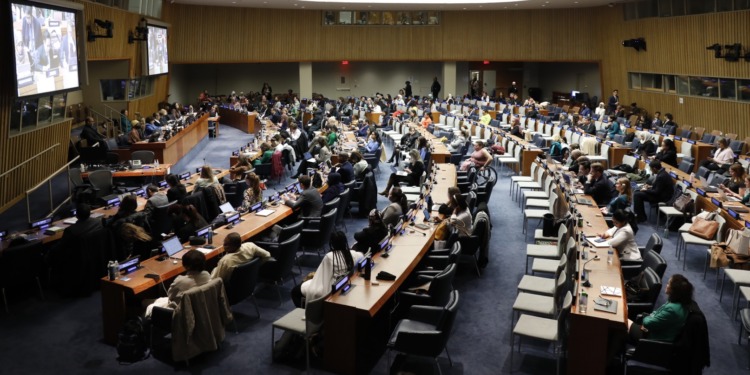The agreed conclusions adopted by Member States provide a blueprint for all stakeholders, including governments, the private sector, civil society and youth to promote the full and equal participation and leadership of women and girls in the design, transformation and integration of digital technologies and innovation processes that fulfill the human rights and needs of women and girls.
The #CSW67 has reached Agreed Conclusions – the first ever to focus on gender equality and the empowerment of women and girls in the context of innovation, technological change, and education in the digital age.@unwomenchief pic.twitter.com/75cnzxWagE
— UN Women (@UN_Women) March 18, 2023
“This year’s Agreed Conclusions are game-changing and bring forward our vision of a more equal and connected world for women and girls in all their diversity. It is our job, as we leave here today, to translate them into reality,” UN Women Executive Director, Sima Bahous, said at the conclusion of the negotiations. “The ultimate success of these Agreed Conclusions lies beyond their finalization today, in how we will collectively take them forward. They bring us a vision of a more equal world. Let us translate them into reality for all women and girls.”
CSW67 reaffirmed the importance of women and girls’ full, equal and meaningful participation and leadership in science, technology and innovation, and expressed concern on the limited progress in closing the gender gap in access to and use of technologies, connectivity, digital literacy and education. It also expressed grave concern about the continuity and interrelation between offline and online violence, harassment and discrimination against women and girls and condemned the increase of such acts.
The Commission called for significantly increased public and private sector investments to bridge the gender digital divide, more inclusive innovation eco-systems, and the promotion of safe and gender-responsive technology and innovation. It also called for inclusive and equitable quality education in science, technology, engineering, and mathematics, information and communications technology and digital literacy to ensure that all women and girls can thrive in a rapidly changing world.
Initiatives to promote innovation and technological change, and education in the digital age for achieving gender equality must consider the following:
- Develop digital tools and services to address the needs of all women and girls, across sectors and geographies, especially for their education, health, economic empowerment and engagement in public life, and ensure women and girls have access to digital literacy and skills throughout their life course.
- Mainstream gender in digital policies to remove barriers to equal access for all women and girls, including those living in poverty, in rural, maritime or remote areas, with disabilities, Indigenous women and girls, migrant women and girls, and older women.
- Foster a policy of zero tolerance for gender-based violence that occurs through or is amplified by the use of technology and ensure that public and private sector entities prioritize its prevention and elimination.
- Mainstream a gender perspective in the design of emerging technologies and adopt regulations to ensure they are subject to adequate safeguards to combat new risks, gender stereotypes and negative social norms, data privacy breaches and improve transparency and accountability.
- Promote policies and programmes to achieve gender parity in emerging scientific and technological fields and create supportive workplaces and education settings, including through gender-responsive education, distance learning solutions and interdisciplinary approaches combining the teaching of social sciences and scientific fields.
- Develop gender-responsive innovation that challenges gender stereotypes and negative social norms, including through the development of digital content, awareness campaigns and teaching competencies for positive engagement on digital technologies that engage, educate, encourage and empowers youth, including young men and boys, to become agents of change for gender equality.
The 67th session of the Commission on the Status of Women took place against the backdrop of continued backlash against women’s rights globally, from increased violence against women in the public space, to the gender impacts of the earthquakes in Syria and Turkiye, to the daily horror that women and girls face in emergency and crisis settings including in Afghanistan, Ukraine and Iran.
Related Articles: Power On: How We Can Supercharge an Equitable Digital Future | Spain Approves Historic Gender Equality Law: A Stepping Stone to Wider Equality? | For Women’s Health, Climate Change and Inequality Are a Dangerous Combination | Female Activism in the Anthropocene: 15 Women Fighting For Our Future
In the first fully in-person session following three years of the COVID-19 pandemic, CSW67 registered very high numbers with more than 7,000 participants, including 4 heads of state and government and 116 ministers, 205 side events on UN premises, and about 700 NGO parallel events.
For the first time, the session included an interactive youth session with young people, youth representatives of delegations, civil society and United Nations organizations, engaging in dialogue and providing recommendations on how to ensure young women and girls are part of the digital transformation.
The Commission also benefited from important contributions from a wide range of civil society organizations including the leaders and commitment makers of the Action Coalition on Technology and Innovation for Gender Equality, launched as part of the Generation Equality Forum. The Action Coalition on Technology and Innovation for Gender Equality has made a significant contribution in cementing alliances between Governments, private sector, civil society and the UN system and in driving momentum and commitments to advance gender equality through technology and innovation.
"This year’s Agreed Conclusions bring us a vision of a more equal world. As we leave here now, let us bring the might of our combined determination to translate them into reality for all women and girls."
– Closing remarks by @unwomenchief Sima Bahous at #CSW67 pic.twitter.com/7VFiG1OME3
— UN Women (@UN_Women) March 18, 2023
— —
This article was originally published by UN Women, and is republished here as part of an editorial collaboration with UN Women.
Editor’s Note: The opinions expressed here by the authors are their own, not those of Impakter.com — In the Featured Photo: The 67th session of the Commission on the Status of Women (CSW67) successfully closed its two-week long session yesterday (6 to 17 March) with the acknowledgment of the critical role of technology and innovation in achieving gender equality. Featured Photo Credit: UN Women/Ryan Brown.










